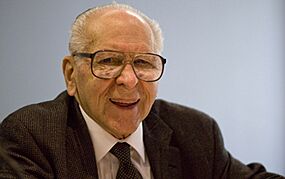Thomas Szasz facts for kids
Quick facts for kids
Thomas Szasz
|
|
|---|---|
| Szász Tamás István | |
 |
|
| Born |
Thomas Stephen Szasz
April 15, 1920 Budapest, Kingdom of Hungary
|
| Died | September 8, 2012 (aged 92) Manlius, New York, U.S.
|
| Citizenship | Hungary, United States |
| Alma mater | University of Cincinnati |
| Known for | Criticism of psychiatry |
| Spouse(s) | Rosine Loshkajian (m. 1951; died 1971) |
| Children | 2 |
| Awards | Award for Greatest Public Service Benefiting the Disadvantaged (1974), Martin Buber Award (1974), Humanist Laureate Award (1995), Great Lake Association of Clinical Medicine Patients' Rights Advocate Award (1995), American Psychological Association Rollo May Award (1998) |
| Scientific career | |
| Fields | Psychiatry |
| Institutions | State University of New York Upstate Medical University |
Thomas Stephen Szasz was a Hungarian-American doctor who studied the mind, called a psychiatrist. He spent most of his career as a professor at the State University of New York Upstate Medical University. Szasz was known for his strong opinions about psychiatry. He questioned its scientific basis and how it was used in society. He believed it was sometimes used to control people.
His famous books, The Myth of Mental Illness (1961) and The Manufacture of Madness (1970), explained his ideas. Szasz argued that "mental illness" is often a way to describe life's problems, not a physical sickness. He said that, unlike physical illnesses, there are no tests to prove most mental health diagnoses.
Szasz always said he was not against psychiatry itself. Instead, he was against forcing people into psychiatric treatment. He strongly opposed putting people in mental hospitals against their will. However, he believed in and practiced therapy when people chose it freely.
Contents
Early Life and Career
Thomas Szasz was born on April 15, 1920, in Budapest, Hungary. In 1938, he moved to the United States. He studied physics at the University of Cincinnati. He then earned his medical degree from the same university in 1944.
After his medical training, Szasz worked at the Chicago Institute for Psychoanalysis. He later joined the State University of New York in 1956. In 1962, he became a tenured professor there. This meant he had a permanent teaching position.
Szasz had two daughters. His wife, Rosine, passed away in 1971. He passed away on September 8, 2012.
Szasz's Main Ideas
Szasz believed that calling certain behaviors "mental disorders" was often just a way of speaking, like a metaphor. He thought this way of speaking could sometimes cause harm. He wanted to challenge the power of mental health authorities. These included psychiatrists, laws, and courts.
He was a critic of how much influence modern medicine had on society. He felt it was becoming like a new kind of religion. Szasz especially focused on psychiatry. He pointed out how it used medical words to describe misbehavior. He also criticized the use of forced hospital stays to protect society. He even spoke against procedures like lobotomy to treat serious mental conditions.
Szasz believed that language had great power in shaping how society works. He thought this was true in small talks between people and in bigger social or political situations. He once said that if a theocracy is rule by priests, and a democracy is rule by the people, then a "pharmacracy" is rule by doctors.
How Szasz's Ideas Grew
Szasz first shared his views on "mental illness" as a legal term in 1958. This was in the Columbia Law Review. He argued that saying someone had a mental illness was no more a fact about their guilt than saying they were possessed by a devil.
In 1961, Szasz spoke to a United States Senate Committee. He argued that using mental hospitals to hold people against their will was wrong. He felt it changed the doctor-patient relationship. It made the doctor seem more like a prison guard.
Awards and Recognition
Thomas Szasz received many honors during his life. He was given over fifty awards, including:
- Named Humanist of the Year by the American Humanist Association (1973)
- Award for Greatest Public Service Benefiting the Disadvantaged (1974)
- Martin Buber Award (1974)
- An honorary doctorate in behavioral science from Universidad Francisco Marroquín (1979)
- Humanist Laureate Award (1995)
- Great Lake Association of Clinical Medicine Patients' Rights Advocate Award (1995)
- American Psychological Association Rollo May Award (1998)
Thomas S. Szasz Award
The Center for Independent Thought created an award in his honor. It is called the Thomas S. Szasz Award. It recognizes people who have made great contributions to civil liberties.
Notable People Who Received the Award
- Giorgio Antonucci
- Vladimir Bukovsky
- Henry Zvi Lothane
- Jeffrey Schaler
- Edward Snowden
- Jacob Sullum
- Phil Zimmermann
- Richard E. Vatz
See also
- Wrongful involuntary commitment
- Scientology front groups
 | DeHart Hubbard |
 | Wilma Rudolph |
 | Jesse Owens |
 | Jackie Joyner-Kersee |
 | Major Taylor |

